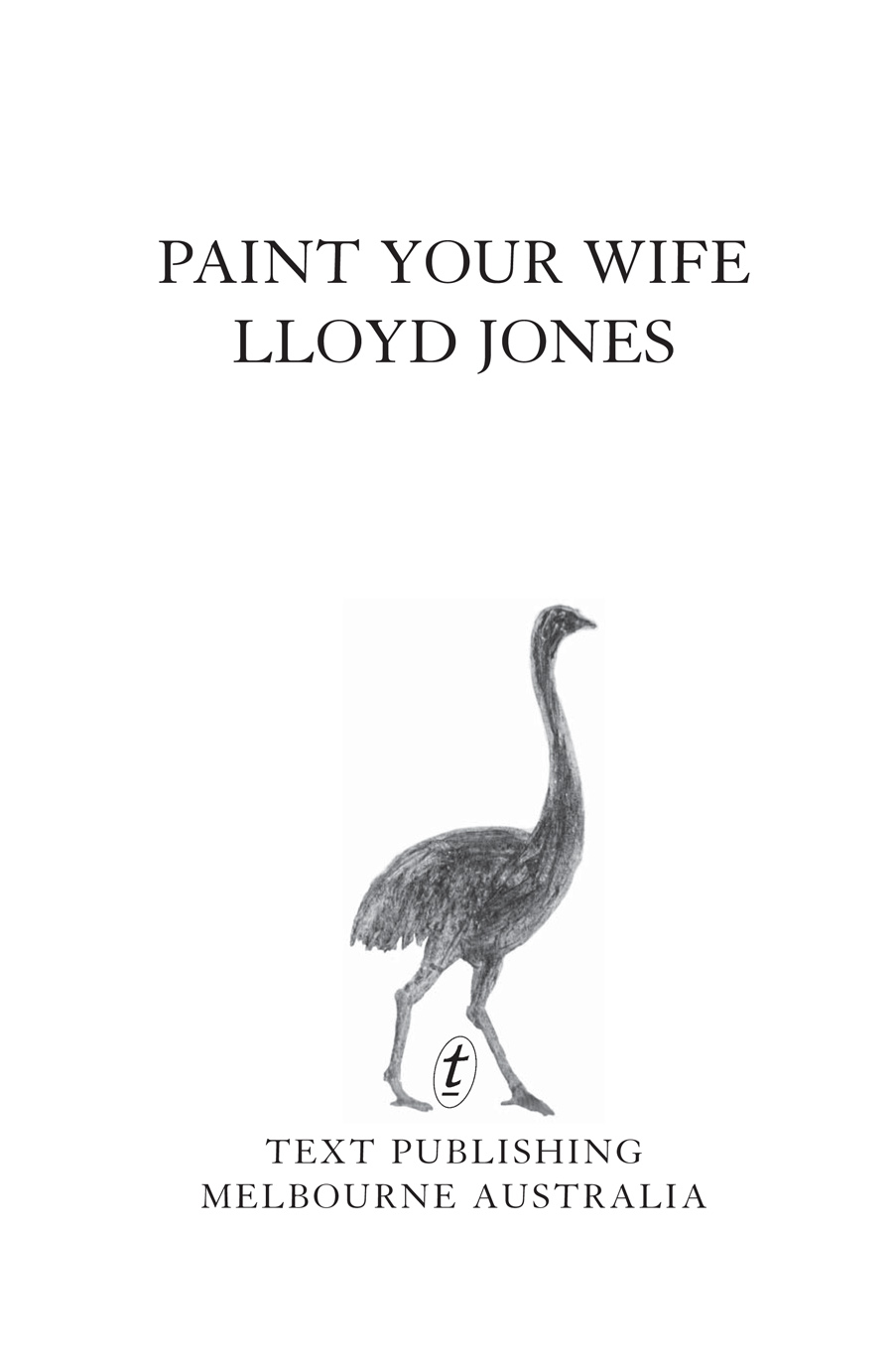Paint Your Wife
Authors: Lloyd Jones



Lloyd Jones was born in New Zealand in 1955. His best-known works include
Mister
Pip
, winner of the Commonwealth Writers' Prize and shortlisted for the Man Booker
Prize,
The Book of Fame
, winner of numerous literary awards,
Hand Me Down World
and
his acclaimed memoir,
A History of Silence
.

The Text Publishing Company
Swann House
22 William Street
Melbourne Victoria 3000
Australia
Copyright © Lloyd Jones 2004
The moral right of Lloyd Jones to be identified as the author of this work has been
asserted.
All rights reserved. Without limiting the rights under copyright above, no part of
this publication shall be reproduced, stored in or introduced into a retrieval system,
or transmitted in any form or by any means (electronic, mechanical, photocopying,
recording or otherwise), without the prior permission of both the copyright owner
and the publisher of this book.
First published by Penguin Books (NZ) Ltd, 2004
This edition published by The Text Publishing Company, 2014
Book design & illustrations by W. H. Chong
Typeset by Midland Typesetting
National Library of Australia Cataloguing-in-Publication entry
Creator: Jones, Lloyd, 1955â author.
Title: Paint your wife / by Lloyd Jones.
ISBN: 9781925095371 (paperback)
ISBN: 9781922182395 (ebook)
Subjects: PaintersâFiction.
Dewey Number: NZ823.2

Contents
I've been visiting our son Adrian in London. He is a year or two older than I was
the first time I flew there, dropping out of the clouds, glancing down at the storybook
burst of Westminster and the serpentine crawl of the Thames. This time around it's
been ten days of lounging about, filling in time reading the newspapers, musing on
the crazy things that happen out there in the world. Hungry car thieves in Sao Paulo
mistake AIDS-infected blood for raspberry jelly. That sort of thing. I was enjoying
myself and London was big and scrambling. I showed up in the shop windows as a smiling
amiable fellow, someone I hardly ever am at home. There were the same row houses
in their grainy white that captured my interest more than twenty years ago as a
newly graduated paint technician. London seemed to be painted in the colours of mist.
The contrast with home was striking. Our houses were like bright coloured marbles
let loose over the plain, shining down from hillsides, beaming up at the broad sky.
More importantly, our paint was guaranteed not to blister or peel, to withstand extreme
conditions. Our white was a cat's-eye white.
Opaque, unpleasant to touch. London's
white was creamy; its grime charmed.
This time London had never looked so green. The weather was brilliant. Blue skies,
the pavements hard and cheerful. I spent much of my time walking and looking for
a park bench on which to sit and open my paper. St James's Park. Holland Park. Hyde
Park. Squirrels running up trunks. Foreign nannies with prams. Boys and girls tongue-kissing
over the rolling park grass.
Around six I'd totter off to some pub or bar rendezvous suggested by Adrian. He'd
ask me what I got up to that day and I might begin to tell him about âThieves in
Sao Pauloâ¦' But he was only interested to know if I'd visited any of the second-hand
shops.
âIf you were over near Portobello Road you could have looked up Mr Musty at least.
I was in there the other day and said you might drop by.'
I had to shake my head and look away guiltily. âAfraid not. Ran out of time.'
Adrian seemed put out. I knew he'd gone to some trouble to look up these places.
âAnyway, the man to ask for in Musty's is Dave somebody. Ginger hair. Missing his
little finger.'
I gave a vague nod of intent.
âYou should, you know.'
âI know I should but I didn't. I ran out of time.'
Just what did I do? I read the newspaper and ordered another cup of tea or looked
for my ref lection in the passing shop windows. Names floated up from the past.
Assorted paint arcana.
In paint tech we used to have a teacher we all liked because he played in a rock
band at weekends. He was entirely bald, apart from a pair of rimless glasses. When
he smiled it was from a position of unrealised advantage. Our paint, he liked to
say, could stand up to the most testing of conditionsâsearing heat, freezing rain,
salt winds. London's paint by comparison would turn to omelette. He said this a lot
and whenever he did we would exchange triumphant smiles.
It'd all turn to omelette.
We loved saying that.
âJohn Ryder. That's it. I knew his name would come to me.' Adrian looked unimpressed.
He doesn't know about the paint tech side of me. When he was born I'd given up paint
for trade in second-hand goods and furnishings. He looked at the dregs in his glass
and drained them.
One night he said he wanted to take me clubbing. I scratched around for a reason
why this wouldn't be possible. I asked where he had in mind and he said in his new
way of speaking, his eyes and face angling off to new arrivals entering the bar,
âDoesn't matter where. Trust me. You'll love it.'
I ended up paying an exorbitant taxi fare. Twenty years ago it had been enough to
walk
everywhere,
and with holes in my shoes. I didn't dream of catching a cab, anywhere.
Adrian
and
his mates seemed unfazed. They all work in the film industryâAdrian said
what
they
did but I can't remember; strange-sounding job descriptions, grippers,
line
people.
They probably catch cabs every day of their lives. On the other hand
I
paid
an amount which in my daily trade in second-hand furnishings was worth a decent
sofa
and
maybe a mattress thrown in. But as I say, Adrian and his mates seemed so
remarkably
cool
about it that I hated to make a fuss. Instead
I followed them through the doors manned
by Nigerians in black leather jackets. They nodded at Adrian but seemed puzzled by
me. I couldn't hear a thing. I gather Adie was explaining, his thumb hooked back
in my direction, while the Nigerian's face hung low to catch the drift. He nodded
at the floor and I passed by his uplifted red eyes. Inside it was a deafening
thump
thump thump.
I had to yell for Adrian to hear.
The price of the drinks was out of this world. It was beers all round for which I
paid after stupidly saying âLet me,' which they did. I paid for another round, and
another one after that, until at last they slipped off the feeding teat and disappeared
into the crowd of bobbing heads. I followed the arrows to something promisingly called
âthe conversation pit' where indeed I had a conversation with a black woman along
the lines of, âYou're black,' to which she smiled patiently and said, âYes. Thank
you. I know.' It wasn't so horribly gauche as that, but not all that far behind either.
I asked her where she was from. She leant her head closer so as to hear and I could
smell all kinds of tropical fruit smells. I said, âAre you from Guyana?' and she
shook her head and her big luscious mouth fell open; she said, âNo, darling, I'm
from around here. Born here, Harry Bryant,' she said. I liked the way she said âHarry
Bryant'.
After some more fumbling of this kind we did manage a conversation. We asked about
each other. We were even going to dance but we didn't in the end. Eventually I used
up all my goodwill and her patience and after saying decently, âWell Mister Mayor,
it's been nice meeting you,' she moved off stylishly, holding her glass with both
hands before her, a whiff of tropical breeze cutting through the thick air. Across
the room
of dancing shadows and shaven heads there was my son grinning back at me.
I don't remember much more of the night. That nice black Brixton woman was the last
decent conversation I had. The rest of the time was filled with noise and beer. And
shots of something in tiny glasses that was painless and irresistible at the time.
I don't recall how we made our way back to Adie's flat; I hope there was a taxi, I
hope no one drove, but that's where I woke feeling just bloody terrible, in a sickly
sweat. The conversation with the nice black woman from âround here' played endlessly
back in my head with a clarity that was cruel and mocking.
I got dressed and slipped out of the flat and drifted to the nearest underground station.
I rose gastrically near St James's Park to warm sunny skies. Flirted with buying
a yoghurt outside a nice-looking deli and thought it best not to tempt fate. Instead
I crossed the road and entered the park.
Everything looked so beautiful and I felt so shitty I could barely stay upright.
I followed a path and felt my age every step of the way. As the morning grew warmer
I found a nice grassy spot to lie on, and there I dozed for a pleasant few hours.
At some point I woke to raised, hectic voices. It was a pick-up game of football
and the goalpostsâtwo humped jerseysâwere only metres away. Twenty years ago I had
joined in these sorts of games at Holland Park. I remember one game played under
an early evening sky where the light actually seemed to stall and we had played on
and on in a state of suspended bliss. Skills I never knew I had revealed themselves;
a flashy slap of the ball off one foot then the other turned the goal-keep, a schoolteacher
with a long pre-war face, and I banged in the
shot past someone's shoe that was standing
in for one upright of the goalposts. A man on a bike who had stopped to watch actually
applauded. Funny that this man, so incidental and anonymous in every other respect,
should rise in my thoughts all these years later. I seem to recall telling someone
who had asked that I was from Sweden. I wanted origins more spectacular than my
own to go with that drive past the shoe upright. And afterwards, on this particular
night, the night of the goal by the young Swede, I went for a beer in the pub opposite
the park gatesâI've long forgotten its nameâand remember falling in with a Nigerian
officer on leave from the war in Biafra. He had a nasty gash over his forehead, and
two nicks in his cheek. Here was another occasion where I was all too aware that
I was speaking to a person of colour, a black man. At the same time I was also determined
to give the impression that his colour was neither here nor there. But of course
that was untrue. It was colour generally which had made an impression on me during
my first trip to London. That new colour white I'd not seen before, and now black.